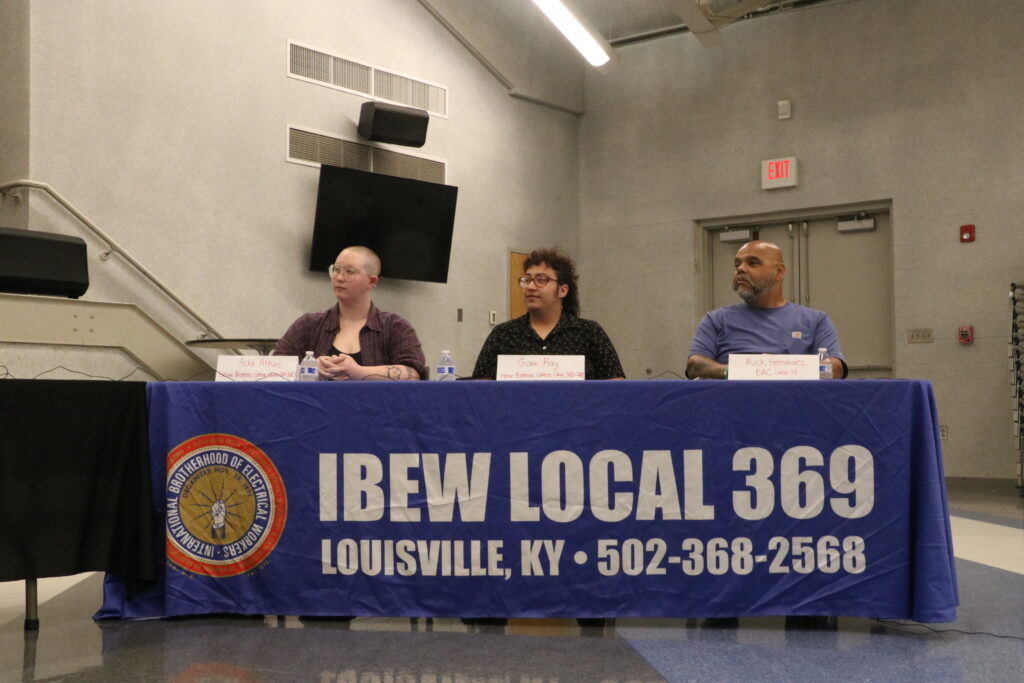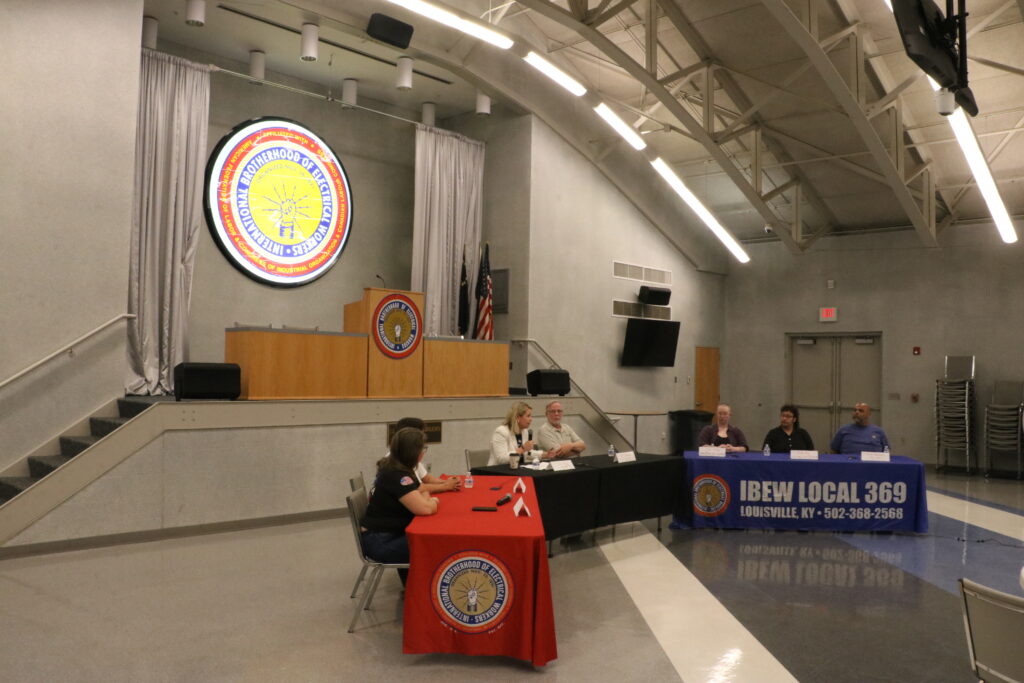16:18
News Story
LOUISVILLE — It wasn’t until two weeks ago that Troy Plumer joined a union, a local chapter of the United Campus Workers, after working for about a decade as an IT professional at the University of Louisville.?
The union, which represents staff and faculty, recently held a rally on campus to protest a new compensation plan offered by the university — something the higher education institution calls “significant investments” in staff — that union members believe does not come close to making up for years of wage stagnation.?
But it was the response he received from college students passing by the rally, asking about the signs and the compensation plan, that stood out to him.?
“I’ve worked at the University for 10 years, and I’ve seen one 2% cost of living increase in that time. And as soon as you tell a 20-something that, expletives fly out of their mouths,” Plumer, 58, said. “They’ll have no part of it.”?
Ahead of Labor Day, Plumer was one of several union members who shared stories of rallying and organizing their workplaces — led in particular by a younger generation — during a Thursday visit from AFL-CIO President Liz Shuler at an IBEW union hall in Louisville.?

The support of young people, Shuler and union members in Louisville say, is driving burgeoning support for organizing workplaces. A survey from the Democratic polling firm GBAO Strategies finds that a large majority of registered voters support unions at 71% with the support of people under 30 even stronger at 88% percent.
Plumer believes the support comes from what younger people see in the increasing unaffordability of housing, not to mention the challenges of paying off student loans.?
“Several of them that I spoke to said, ‘You know, we don’t have any hope. Like, look at the debt we’re under and look at what housing costs and how long it’s going to take us to pay that off — and what’s the notion of a retirement?’” Plumer said.?
Kentucky, like the rest of the nation, has seen a decline in union membership over past decades: 14.9% of wage and salaried workers in Kentucky were union members in 1989, down by almost half at 7.9% in 2022, according to the U.S. Bureau of Labor Statistics.?
Yet in recent years, interest in organizing unions has surged across the country driven in large part by working conditions during the COVID-19 pandemic, something that Shuler believes “shined a bright light” on working conditions for many employees.
“Young people have seen what their parents had and generations before them, and now they’re getting the short end of the stick,” Shuler said Thursday evening. “Workers were making sacrifices and told to kind of get through it, and it’ll pay off — and it absolutely has done the opposite.”?
Kentucky has also seen its share of new union activity as about a couple dozen workplaces this year have filed for elections to organize a union. Those workplaces include two Starbucks stores in Elizabethtown, line technicians and other staff at an electric cooperative in Somerset and the staff of the American Civil Liberties Union of Kentucky.?
Established unions in Kentucky have also received attention, with Teamsters representing thousands of workers at the United Parcel Service’s Worldport Hub in Louisville holding rallies and practicing picketing earlier this summer ahead of a strike that was ultimately averted. The deal between union and company brought starting wages for part-time UPS workers to $21 an hour and full-time workers up to an average top wage of $49 an hour. The union also secured workplace safety protections such as air conditioning in new vehicles starting in 2024.?
The United Auto Workers local representing Ford workers in Louisville is also threatening to strike, asking automakers for wage increases, cost-of-living adjustments, pensions for all employees, medial benefits for retirees and more.
Addi Atkins, 24, a steward for the union representing Heine Brothers Coffee stores across the Louisville metro area, said their union ratified a contract in March after voting to unionize the stores months prior.?
Finding the courage to share experiences and issues about one’s workplace whether that’s wages or other benefits, Atkins said, is one of the hardest parts about organizing a union.?
“I think that it can feel very isolating when you are experiencing issues in the workplace,” they said. “I think it just takes that one person, that one movement to kind of nudge people out of their shells.”?
Atkins and other union members strongly believe Louisville is a robust “union town,” but union leaders acknowledged workplaces in Kentucky’s more rural areas can be harder to organize.?
Rural communities across Kentucky have handily delivered victories to Republicans in the past decade with the GOP recently achieving a plurality of registered voters in the state. The GBAO Strategies survey found the strongest opposition against unions and strikes came from Republicans, with only 52% of Republicans — still a majority — supporting unions.?
Kentucky State AFL-CIO President Bill Londrigan said some communities “have been propagandized by the right wing” against union membership that makes it more difficult to organize. But at the same time, he said, unions aren’t explicitly partisan.?
In recent years, Kentucky unions have pushed back against GOP-supported legislation, particularly a so-called “right-to-work” law passed in 2017 that made it illegal to require employees to join a union or collect fees from employees who don’t want to be in a union. Unions are also challenging a new GOP-sponsored state law this year that prevents some public-sector unions from collecting union dues through payroll deductions, which a Jefferson County judge temporarily blocked.
“We’re interested in talking to them about their jobs and their livelihoods, their living standards and their wages, and that cuts across politics in many cases,” Londrigan said.?
The endorsements of unions have played a role in this year’s gubernatorial election, too. Even though Kentucky hasn’t had a unionized coal mine in years, the United Mine Workers of America endorsed incumbent Democrat Andy Beshear; Republican candidate Daniel Cameron received the endorsement of the Kentucky State Fraternal Order of Police.?
For Londrigan, increasing union membership to levels seen in past decades is a “long struggle” that younger generations will play a key role in.?
“We’ve been involved with this struggle for well over a century,” Londrigan said. “The only thing that we can do is keep on keeping on, and keep on fighting. And that’s what’s going to make a difference.”?

Our stories may be republished online or in print under Creative Commons license CC BY-NC-ND 4.0. We ask that you edit only for style or to shorten, provide proper attribution and link to our website. AP and Getty images may not be republished. Please see our republishing guidelines for use of any other photos and graphics.
Liam Niemeyer
Liam covers government and policy in Kentucky and its impacts throughout the Commonwealth for the Kentucky Lantern. He most recently spent four years reporting award-winning stories for WKMS Public Radio in Murray.
Kentucky Lantern is part of States Newsroom, the nation’s largest state-focused nonprofit news organization.





